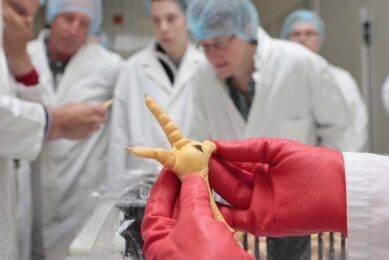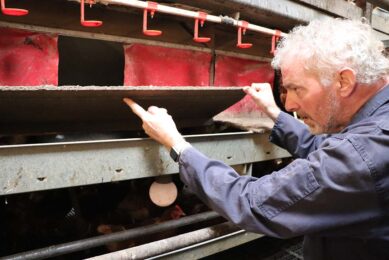Study of food-borne bacteria focuses on Campylobacter

A team of researchers led by veterinary medicine faculty at Iowa State University has received a $2.5 million grant to study food-borne bacteria with a focus on Campylobacter.
The grant from the US Department of Agriculture’s National Institute of Food and Agriculture will help the researchers develop new methods to manage Campylobacter, a pathogen carried primarily by poultry that has proven difficult to contain.
Campylobacter is a leading cause of food-borne illness in the United States, said Qijing Zhang, an associate dean in the ISU College of Veterinary Medicine. Zhang, the lead researcher on the team, said the bacteria are difficult to track and contain because infected poultry show no signs of illness.
“Campylobacter doesn’t actually make the bird sick,” he said. “This makes it very difficult to know where the pathogen is.”
The research team aims to identify risk factors that affect the likelihood of Campylobacter infection among live birds and contamination among poultry carcasses. The team also will work with the poultry industry to reduce the prevalence of infection.
Zhang said the team will look at a wide range of strategies including improved management practices, vaccines, litter treatment and ways to process poultry meat at processing plants.
“There’s no silver bullet, so we have to take an integrated approach,” he said. “There are multiple ways that the pathogen can get into the poultry.”
Orhan Sahin, an ISU research assistant professor in the Department of Veterinary Microbiology and Preventive Medicine, said Campylobacter causes an estimated 800,000 illnesses a year in the United States, including around 8,000 hospitalisations.
Eight of the 11 research team members are from Iowa State. The ISU personnel represent both the College of Veterinary Medicine and the College of Agriculture and Life Sciences. Other institutions contributing to the project are the University of Tennessee and The Ohio State University. Tennessee personnel will focus on vaccines, while Ohio State personnel will look at how management of poultry litter on farms contributes to Campylobacter reduction.
Darrell Trampel, an ISU professor of veterinary diagnostic and production animal medicine and Extension poultry veterinarian, will oversee the extension and outreach portion of the grant. Trampel said the project will include a website keeping poultry producers, processors, and consumers up to date on the project.
“The goal is to take an integrated approach and work with the industry so they can start to adopt new strategies to reduce infections,” Trampel said.
Join 31,000+ subscribers
Subscribe to our newsletter to stay updated about all the need-to-know content in the poultry sector, three times a week. Beheer
Beheer








 WP Admin
WP Admin  Bewerk bericht
Bewerk bericht